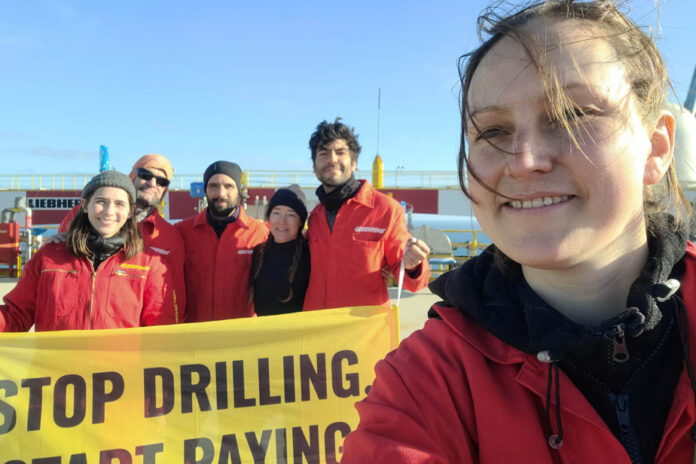(London) Shell is demanding $2.1 million from Greenpeace in British court after six activists boarded the oil giant’s ship at the start of the year to denounce the exploitation of fossil fuels, it has been reported learned Thursday from the NGO and the company.
This trial is “intimidation”, denounced Greenpeace in a press release, which defines the complaint as “one of the greatest legal threats” that the NGO has had to face “during its more than 50 years of history”. , and claims that Shell is trying to “ban him from protesting to silence his climate demands.”
Six Greenpeace activists boarded twice, at the end of January and the beginning of February, aboard a moving ship which was then cruising in the Atlantic Ocean, carrying a Shell platform intended to expand an oil and gas field in Scotland. They stayed there for several days.
“Shell and its subcontractors have the right to recover the significant costs associated with responding to Greenpeace’s dangerous actions,” the group argued in a statement sent to AFP.
The company explains in particular that “significant” costs were necessary to obtain injunctions aimed at preventing further boarding of activists on its ship, but also to ensure the safety of demonstrators and crew.
According to procedural documents that AFP was able to consult, Shell is asking the High Court in London for $2.1 million in compensation, mainly linked to costs incurred by Fluor, an American subcontractor responsible for manufacturing and delivering the platform. – the latter could also claim an additional $6.5 million.
Greenpeace also protested Thursday against a proposal from Shell to reduce the damages claimed to 1.4 million if the organization undertakes “never again to protest against [Shell’s] infrastructure, at sea or in ports, where anywhere in the world,” according to the NGO’s press release.
But “our intention has been distorted,” a Shell spokesperson told AFP, “it is simply about preventing actions at sea or in ports that could endanger people’s lives – such as this happened earlier this year – and nothing more.”
“The right to protest is fundamental and we absolutely respect it. But it must be done safely and legally,” Shell assured earlier in its statement.
The oil giant notably returned in June to a commitment to reduce its crude production by 1 to 2% per year, now counting on “stable” production until 2030, arousing the ire of environmentalists.















